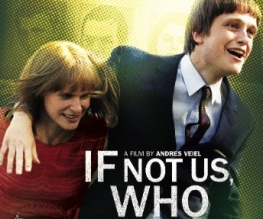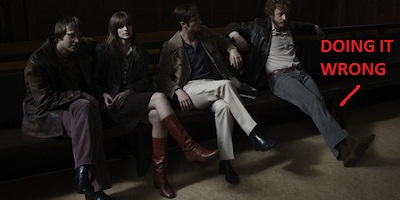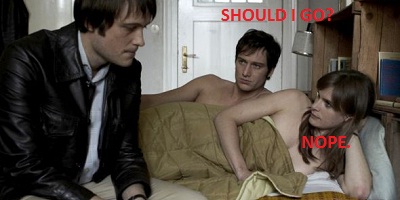If Not Us, Who?

We open on a cat catching and killing an unsuspecting nightingale. Enraged, the man of the house kills the cat with a rifle, explaining to his grief-stricken son that, had he not disposed of the cat, eventually there would be no beautiful nightingale song. Hopefully you’re paying attention, because this simple moral quandary reoccurs throughout the offputtingly titled If Not Us, Who?. We’re shocked by the cat’s death; but dude, what about the nightingales? Is the death of one more justified than the death of the other… or to put it another way, is one immorality less immoral than the other?

Flash forward to 1961 and the young lad has grown up to be Bernward Vesper (August Diehl), an extremely pretentious, arrogant and enviably switched-on literary scholar; the kind of guy who’ll dick on Hemingway and actually be able to back it up. His father is the infamous Will Vesper (Thomas Thieme), an undeniably great author and unwavering supporter of the Nazi party, whose stock currently lies somewhere between ‘stone dead’ and ‘we’re all pretending it never existed’. Bernward begins a very physical romance with classmate Gudrun Ensslin (Lena Lauzemis) – fans of German anarchism may be getting twitchy now – and together they start a publishing enterprise. Their first publication? One of Will Vesper’s most controversial novels. But is it possible to overlook a novel’s content to see it purely as a piece of literature, and should such a novel be given that chance?
As time progresses, Bernward and Gudrun become more and more outraged by the denial and oppression they see around them, and this is reflected in their work when they publish German translations of pamphlets from the violent American Civil Rights activists The Black Panthers; even though Bernward is told by prominent Black Panther figure Stokely Carmichael that the best way he could help the Civil Rights Movement would be to go home and hang himself and his white family. Soon violent protest becomes the topic of the day, and Gudrun gets involved with Andreas Baader (Alexander Fehling): yep, him who shared a complex with Meinhoff.

These questions of morality are presented on a more human, personal level too. Running parallel to this historical backdrop is the development of the explosive central relationship between our two leads. The frequent emotional abuse that they inflict on each other makes for uncomfortable viewing. Bernward’s attitude to fidelity is Tiger-esque, and Gudrun’s eventual affair with Andreas leads her to make a frankly unforgivable choice. Are we really supposed to take their campaign for human rights seriously if they clear have such little regard for each other’s?
Andreas represents an even more stark contrast. In Gurdrun’s eyes, he’s the absolute nuts; brave, outspoken, right about everything.. also, really cool and really sexy. In reality, he’s an arrogant child, opting to violent measures because he’s got no better ideas and, more worryingly, because it’ll make him look cool. He also, in a later scene, reveals that he’s not above ‘Doing a Chris Brown’ when trying to make a point. This, ladies and gents, is your righteous force for social change, and most people don’t even want him in their house.

That If Not Us, Who? manages all this without ever bordering on preachy or ponderous is pretty staggering. Exposition is kept to an absolute minimum, with historical events covered by newsreel clips and brief, naturalistic conversations. There’s no patronizing explanations of the film’s themes and moral dilemmas here; indeed, you could easily watch the whole thing as a simple biopic, if you were so inclined. Backing up the script are strong, authentic performances from the whole cast, and unfussy direction; y’know, the kind that pretty much every half-decent German film has. Though its unfortunately awkward title wont do it any favours, this will make for a nice companion piece to The Baader-Meinhoff Complex.

Recent Comments